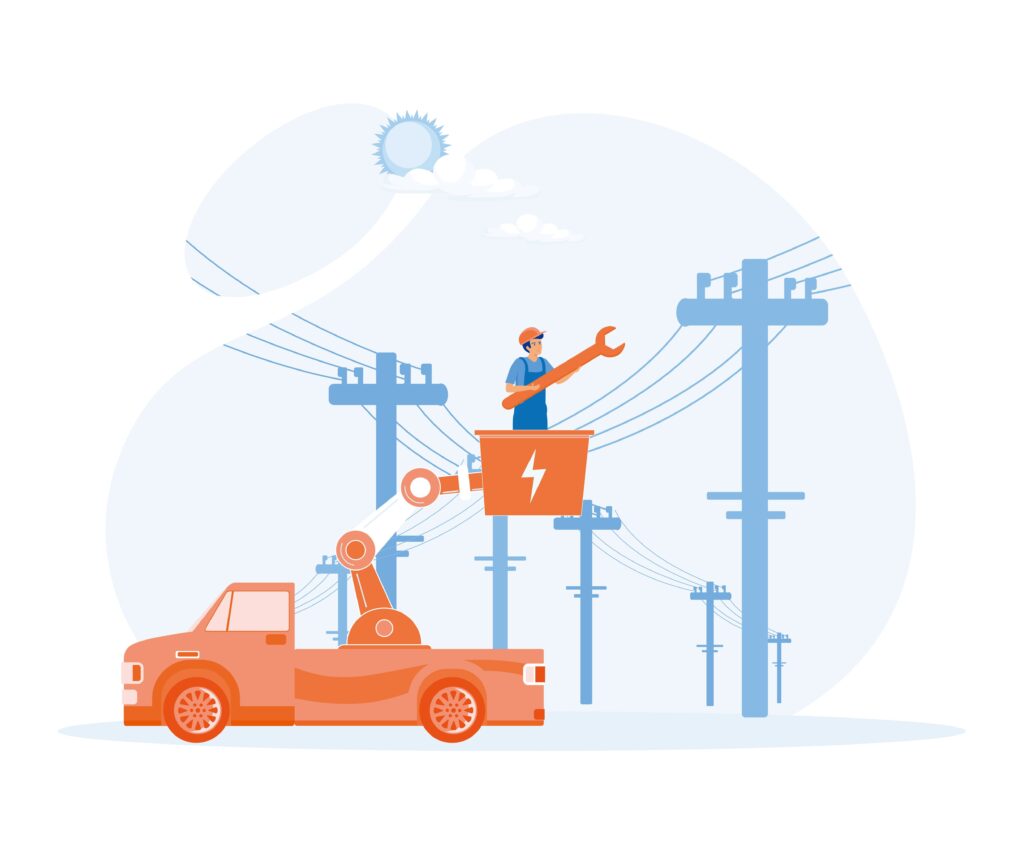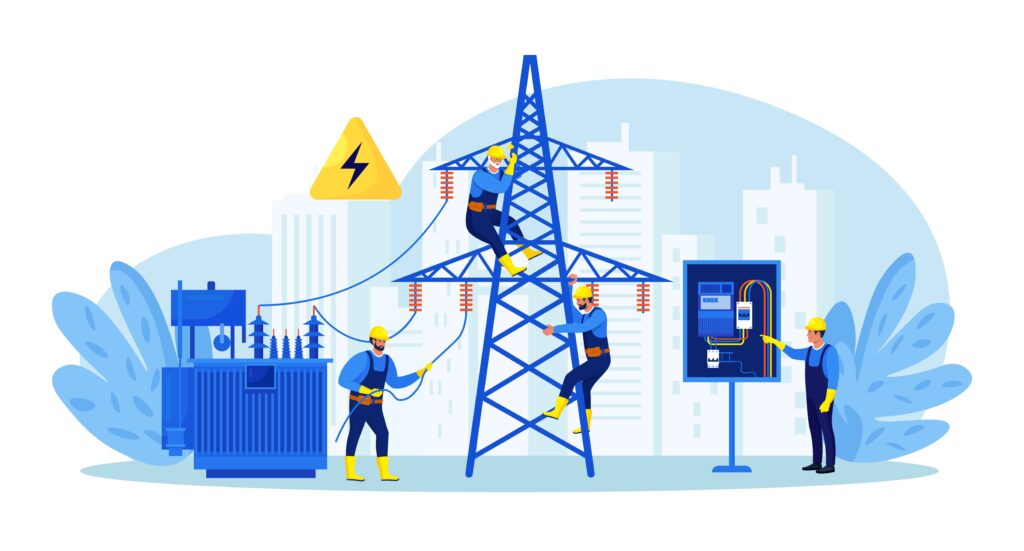Lineman requirements typically include a high school diploma and completion of an apprenticeship program. Prospective linemen must also demonstrate physical fitness and technical aptitude.
A career as a lineman entails maintaining and repairing electrical power systems and telecommunications cables. It is a highly skilled trade that demands both physical durability and keen technical knowledge. Aspiring linemen need to start with a solid educational foundation, typically at least a high school diploma or GED.
This is followed by specialized training through vocational schools or community colleges offering lineman programs or through direct apprenticeship programs, which combine on-the-job training with classroom instruction. Additionally, since safety is paramount, candidates must undergo rigorous safety training to work proficiently in hazardous conditions. The role requires a strong understanding of electrical systems, problem-solving skills, and the capability to work at heights. Candidates often need a commercial driver’s license, as driving utility vehicles is part of the job. Varied weather conditions cannot deter a lineman; therefore, adaptability and a commitment to continuous learning are indispensable for success in this field.
Education And Training
Welcome to the fundamental gateway towards a fulfilling career as a lineman, where education and training stand as pivotal pillars. The journey toward this electrifying vocation commences with robust educational groundwork and hands-on technical experience. Prospective linemen must navigate a multifaceted terrain of learning. Let’s demystify the prerequisites that pave their path.
Educational Requirements
The first step to powerline success begins with a solid educational base. Aspiring linemen require a high school diploma or GED equivalent. Key subjects that form a foundation include mathematics, physics, and English. These subjects help in understanding technical manuals and safety protocols.
| Subject | Importance |
|---|---|
| Mathematics | Calculates line installations and loads. |
| Physics | Understands electrical principles. |
| English | Communicates effectively in the field. |
Technical Training
Post-secondary technical training is crucial. Trade schools and community colleges offer lineman programs lasting up to two years. These programs combine classroom knowledge with practical skills. Look for courses accredited by the Electrical Lineworker Program Accreditation.
- Safety practices are central to the curriculum.
- Climbing techniques prepare candidates for pole work.
- Electrical theory deepens their understanding of the trade.
Completion of such a program often leads to an apprenticeship. Here, candidates gain valuable field experience. Apprenticeships typically span four years and include extensive on-the-job training under seasoned linemen.
- Measure and grade for underground cables.
- Install and maintain transformers.
- Practice emergency response and power restoration.
Skills And Abilities
Welcome to the ‘Skills and Abilities’ essential for a lineman, a role crucial in maintaining and repairing electrical power systems. In this segment, we delve into the core competencies that a lineman must possess. Each skill set contributes significantly to their effectiveness and safety on the job.
Physical Fitness
Linemen must be in top physical condition. The job involves climbing poles, lifting heavy equipment, and working in adverse weather conditions. Key aspects of physical fitness include:
- Strength to handle tools and materials
- Stamina for long hours, often in extreme conditions
- Agility to maneuver around obstacles safely
- Balance for working at heights
Technical Skills
Technical knowledge is vital for a lineman. These professionals must understand electrical theory and be adept at practical tasks. The following table summarizes the crucial technical skills required:
| Category | Skills Required |
|---|---|
| Electrical Knowledge | Understanding of currents, circuits, and safety standards |
| Equipment Handling | Proficient with tools such as pliers, wire strippers, and voltage detectors |
| Troubleshooting | Identify and fix faults in electrical lines and equipment |
| Installation | Set up wires, transformers, and other electrical components |
Certifications And Licensing
Aspiring linemen must meet critical certifications and licensing requirements to ensure safety and competence in this high-demand profession. Let’s dive into what certifications are necessary and explore the licensing process that all potential linemen need to navigate.

Certifications For Linemen
Certifications affirm a lineman’s ability and knowledge. Employers look for these credentials when hiring.
- Commercial Driver’s License (CDL): Essential for operating heavy vehicles.
- Certified Lineman’s Rodeo Association recognition showcases skill competencies.
- Electrical Lineworker Certification through accredited programs provides comprehensive training.
- OSHA Certifications are crucial for safety compliance.
Licensing Process
State regulations guide the licensing process for linemen. Candidates must pass rigorous exams to practice.
- Complete an approved apprenticeship or lineman training program.
- Acquire necessary experience hours, often fulfilled during apprenticeships.
- Submit the application and fees to the relevant licensing body.
- Successfully pass written and practical exams.
- Maintain and renew licenses, often requiring continuing education.
On-the-job Experience
Building a career as a lineman demands practical, hands-on experience. Mastering the skills necessary to work on power lines often involves a blend of formal education and real-world training. This on-the-job experience plays a pivotal role in shaping adept professionals in the field.
Apprenticeship Programs
Becoming a lineman starts with comprehensive apprenticeship programs. These programs combine classroom learning with extensive fieldwork, totaling thousands of hours. Apprentices gain knowledge in safety protocols, electrical theory, and equipment use—all crucial to their future success.
- Duration: Typically 4 years or 8,000 hours
- Qualifications: High school diploma or equivalent
- Paid Training: Apprentices earn while they learn
- Certification: Journeyman lineman upon completion
Field Experience
In-field experience is where knowledge turns into expertise. Linemen work in various weather conditions and heights to install, repair, and maintain power lines. The experience molds them into resilient and quick-thinking workers. Teams of seasoned linemen pass on skills to novices, cementing their abilities.
| Experience Level | Skills Gained | Responsibilities |
|---|---|---|
| Entry-Level | Basic equipment handling, safety practices | Assist in simple tasks, observe senior linemen |
| Mid-Level | Advanced technical skills, team coordination | Execute complex operations, mentor apprentices |
| Expert-Level | Leadership, specialized knowledge | Supervise projects, emergency response leadership |
Safety Protocols
Linemen face daily risks while ensuring our lights stay on. To maintain a safe work environment, they must adhere to strict safety protocols. These protocols protect both the lineman and the infrastructure they work on.
Understanding Hazards
Recognizing the dangers is the first step in prevention.
- Electrical Shocks: Direct contact with live wires can be deadly.
- Falls: Working at heights requires proper harnessing techniques.
- Equipment: Faulty gear can create unexpected threats.
Implementing Safety Measures
Training linemen on best practices minimizes accidents.
- Wear protective clothing to guard against electrical burns.
- Use insulated tools to handle high voltage equipment safely.
- Apply lockout/tagout procedures to control circuit access.
| Item | Function |
|---|---|
| Gloves | Insulation from electrical charge |
| Hard Hat | Protection from falling objects |
| Safety Glasses | Shield eyes from sparks |
Regular safety drills keep preparedness high. Linemen must stay diligent to ensure the community’s needs and their safety align.
Tools And Equipment
Linemen stand as unsung heroes, ensuring electricity flows to our communities. They need an arsenal of specialized tools and equipment to safely and efficiently tackle their high-stakes tasks. Let’s explore what every lineman should have in their toolkit.
Essential Tools
The backbone of a lineman’s job is the essential tools.
- Pliers – An indispensable tool for wire gripping and cutting.
- Cable Cutters – Crucial for slicing through thick wires.
- Wire Strippers – Necessary for removing insulation from wires.
- Screwdrivers – A basic requirement for assembling equipment.
In addition to hand tools, linemen rely on powered devices to streamline their workflow.
- Hydraulic Crimpers – They secure the connectors to cables.
- Drills – Essential for creating entry points in poles.
Without these, tackling the complexities of electrical systems could be daunting.
Work Gear
Protection and utility define the work gear of a lineman.
| Piece of Gear | Importance |
|---|---|
| Hard Hats | Shield against falling objects and electrical hazards. |
| Rubber Gloves | Insulation from electrical shocks. |
| Safety Glasses | Protection for eyes from debris and sparks. |
| Tool Belt | Keeps essential tools within reach. |
Comfortable, durable clothing and boots protect from the elements and ensure safety during climbs.
Career Outlook
The career outlook for lineman is an essential consideration for those interested in entering this field. High demand for skilled professionals characterizes the energy sector. With ongoing infrastructure upgrades and the expansion of new energy sources, aspiring linemen can expect a robust job market. Let’s explore the employment trends and advancement opportunities.
Job Growth
The job market for linemen demonstrates consistent growth. Reasons include an aging workforce and the need for modern electricity grids. Data from the Bureau of Labor Statistics (BLS) projects above-average growth for these roles. This translates into more job openings and a promising future for newcomers.
Opportunities For Advancement
Career progression for linemen often follows a well-defined path. Experience and certification lead to better positions. Here are key milestones for career advancement:
- Apprentice Lineman: Starting point for those learning the trade.
- Journeyman Lineman: Achievable with years of experience and completion of apprenticeships.
- Lead Lineman: Supervisory role overseeing projects and teams.
- Management positions: Possible with further education and leadership skills.

Frequently Asked Questions
What Do You Need To Be A Lineman In Texas?
To become a lineman in Texas, you need a high school diploma or GED. Complete a lineman training program, earn a Commercial Driver’s License (CDL), and acquire on-the-job experience. Obtain certification, such as the NCCER or OSHA, for career advancement.
How Long Does It Take To Become A Lineman In Texas?
Becoming a lineman in Texas typically takes about 7,000 hours of apprenticeship, which equates to approximately 3 to 4 years of on-the-job training and technical education.
How Hard Is It To Be A Lineman?
Being a lineman is challenging due to physical demands, rigorous training, and working with high-voltage lines, often in extreme weather conditions. Safety risks and long hours add to the job’s difficulty.
How Tall Should You Be To Be A Lineman?
There’s no specific height requirement to be a lineman; skills and physical fitness are more crucial. Most employers focus on agility, strength, and endurance rather than height.
Conclusion
Embarking on a lineman career is more than just a job; it’s a commitment to safety, learning, and physical aptitude. With the outlined prerequisites and certification processes, prospects can confidently step toward this vital and rewarding profession. Remember, continuous education and dedication to safety protocols define the journey of a skilled lineman.


